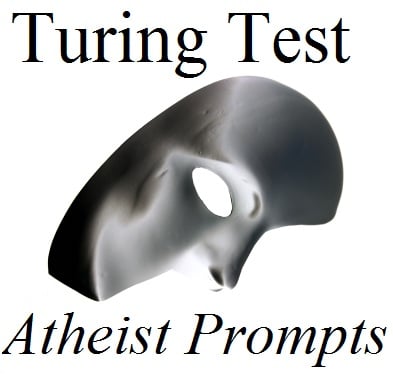This is the fifth entry in the Atheist round of the 2013 Ideological Turing Test. This year, atheists and Christians responded to questions about sex, death, and literature.
Polyamory
As the world currently stands, I think limiting state-recognized marriage to two people might be reasonable, but on logistical grounds rather than those of justice or rights, and less so than is commonly thought. To elaborate, I’d like to make a distinction between state-sanctioned approval and the system of rights, responsibilities and benefits that are currently considered part of marriage.
The first question is primarily one of state-supported social approval; we are asking ourselves what kinds of models for families we’d like to promote, encourage and support. When we answer such a question, we must admit that we are implicitly deciding that there are certain types of families and unions that do not deserve our approval. Some would declare the very existence of such a hierarchy unjust and immoral; it is in fact a grave thing to tell people who have bonded themselves to others in ways we disapprove of that we wish never to encourage others to be like them. That said, there is an understanding that in general, long-term, committed relationships are on average good for the people in them and any children they may produce. Furthermore, it seems only reasonable that only relatively longer term relationships and unions would receive any kind of official sanction, since those in short-term relationships would have little use for it. Under this model, there are no grounds for denying state recognition to polyamorous groupings on the sole basis of their polyamory except perhaps legal, logistical difficulties (though these seem minimal – write down a list of people, everyone on the list signs it, the end). Polyamorous groups can be and are often: stable, incredibly committed, beneficial and joyous for the people in them and totally capable of raising children. Let us celebrate them!
The question of the rights and responsibilities that come with marriage is a trickier one, but again my answer is that logistics are the primary concern. Yes, the availability of a polyamorous option would make tax benefits and breaks more difficult to adjudicate, there would be more opportunity for insurance, immigration and other kinds of fraud, hospital visitations and name changes would be less obvious, and so on. Perhaps that’s enough of a reason not to allow polyamorous marriage; I’m not a tax lawyer, so I don’t know how much of a burden it would be.
But on several of those issues, and other common arguments against the recognition of polyamory, I am left unconvinced that the problems are insoluble. In fact, some of these changes would force important legal questions (who is actually responsible for the raising of a specific child?) to be dealt with more deliberately and intentionally. This would be a benefit, not a drawback. I would be thrilled for name changes to be less of a given and more of a decision. Hospital visitation could be a chosen list instead of an assumption that blood relatives are in the best position to provide care. And so on and so forth.
The potential negatives, such as fraud and abuse, are orthogonal to the question of which relationships benefit their communities more when given access to rights, benefits and responsibilities. I hold that the problem with outposts of Mormon polygamists in which adult men marry 14 year old girls is that adult men are marrying 14 year old girls, not that the girls are to become second wives. Using polyamory as a proxy for these issues is reasonable only in the Bayesian Empire (which, if we’re starting, sign me up), not in a country where we acknowledge that sometimes expanding rights comes with inconveniences. Now, if in fact these concerns are absolutely insurmountable, and there is no way to eradicate or minimize grave crimes without outlawing a system of marriage, so be it. This challenge is not the foremost of our generation, and I can understand it being set aside in favor of other issues. And in the end, it may be that the effort is not worth the few it will help. But we should not be fooled into thinking that there is something intrinsic about polyamory that makes it incompatible with our current system of marriage.
Euthanasia
It is permissible to end a life when a person on reflection and after a reasonable amount of time with a consistent desire to end their life asks that they be helped to end their lives, and if the person who is being asked feels that there is no better way to satisfy this person’s desires. If a person is in the kind of chronic, constant, misery-inducing, unresolvable pain that is the worst case scenario of the above, and someone else is in a position to give them a safe and painless death, I think that the permission could rise to the level of obligation. The definition I’ve laid out here preserves our understanding of consent and the autonomy and dignity of the person in question while also acknowledging that life can become so painful that it is reasonable to desire to end one’s life. On the other hand, it allows us to admit that sometimes people can want to end their lives in circumstances where we would not want to grant such a wish, such as in cases where there is a good chance of getting better and being in less pain, physical or emotional.
There is, in this case, not much of a moral difference between intervening to kill and refusing to take active action to extend life. It may be that a treatment is incredibly difficult or costly to administer, and this must be taken into account in the decision, just as all decisions involve a cost-benefit analysis, but no one should consider themselves more moral because they let someone choke or asphyxiate naturally instead of providing them with a painless morphine overdose. If there is a way to extend someone’s life which you choose not to take, that is a decision to have their life end earlier. If that is within the purview of the above definition, this is moral; otherwise, not. The action/omission question does not seem relevant here.
You can vote on whether you think these answers were written by a Christian or an Atheist here. Comments are open to discuss the substance of the post and for speculation about the true beliefs of the author, so please vote before looking at the comments.












